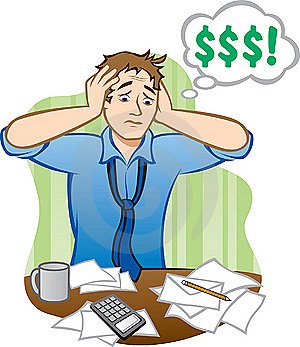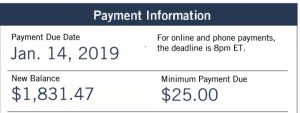
How to Avoid Paying Interest on Credit Cards
By Article Posted by Staff Contributor
The estimated reading time for this post is 142 seconds
Avoid paying interest on credit cards can help build an emergency fund and strengthen your financial statement. We are not talking about free lunch here. After all, all loans carry interest charges.
Credit cards are the worst-best financial product–they give you great convenience and security, and they can ruin your finances and push you towards bankruptcy. So, how you navigate that thin line between financial security and financial disaster is imperative.
Credit Debt Is Expensive
Credit card issuers charge you an annual percentage rate (APR) for using their card. The APR can be between 15% and 29.99 percent. Credit card debt is expensive, and it can ruin your finances.
For example, if your credit company charges 27.74% APR* and your outstanding balance is $9,333, which is the average credit debt American consumer has, it will take you 14.5 years to pay it off if you don’t make any additional purchases.
By making a monthly payment of roughly $220, you will end up paying $28,655 worth of interest alone. Learn how interest rate works here
How Do You Avoid Paying Interest?
All you need to do is pay off the last statement balance in full by the due date. Let me explain–credit card companies, all of them, give you 25 days to pay your last statement balance. The twenty days is your grace period; as long as you pay that previous statement balance on or before the due date, you incur no finance charges
Here’s How It Works
If your statement closing date were on the 17th of December, the credit card company would give you until about the 15th of January to pay that last statement balance in full with no interest accrued.
Also, you pay no financing charges on all transactions made from December 18th through January 17th until February 15th. If you follow that formula, you have a lifetime 0.00% APR. You might get money from the credit card companies if you use a cash reward card.
Common Mistakes
As you can see from the above screenshot, the payment due date is January 14th, and the minimum payment due is $25. If you make the minimum payment on January 14th, your account is in good standing with the credit card company. However, paying the minimum payment is the absolute wrong thing to do since the remaining balance from the last statement is going to be added to your new purchases to calculate interest charges.
Let’s say you pay the $25 on January 14th and go back and pay $1,806.47 ($1,831.47-$25.00) on January 18th, all your transactions from December 18th until January closing statement will accrue interest.
To avoid a finance charge, you have to pay all of the $1,831.47 on or before January 14, 2019.
When used correctly, credit cards can be an enhancement to one’s financial statement
*The Wells Fargo Cash Wise credit card charges APR up to 27.74%
RELATED ARTICLES
Financial Nihilism: How Millennials and Gen Z Are Betting Against Economic Reality
The estimated reading time for this post is 181 seconds A few days ago, I saw a social media video of a guy who, not even 35 years old, spent a considerable amount of time in line at a Caesars...
Saving vs. Investing: What’s the Difference?
The estimated reading time for this post is 173 seconds When managing your finances, two terms often pop up: saving and investing. But what’s the difference, and how do you decide which one’s right for you? Understanding these concepts can...
Leave Comment
Cancel reply
Financial Nihilism: How Millennials and Gen Z Are Betting Against Economic Reality

Saving vs. Investing: What’s the Difference?

Exploring the Financial Challenges of the Unbanked: Insights from the FDIC’s 2023 Survey
Gig Economy
American Middle Class / Nov 02, 2024
2025 401(k) limit: $23,500; IRA limit unchanged
The estimated reading time for this post is 191 seconds Maximize Your Retirement Savings in 2024: Key IRS Adjustments to Know Saving for retirement just got...
By Article Posted by Staff Contributor
American Middle Class / Oct 30, 2024
US Economy Update
The estimated reading time for this post is 139 seconds The Bureau of Economic Analysis (BEA) report indicates solid economic growth in the third quarter of...
By FMC Editorial Team
American Middle Class / Oct 29, 2024
Zero-Based Budgeting: A Guide on Tracking Every Dollar to Maximize Savings
The estimated reading time for this post is 324 seconds Introduction: Why Zero-Based Budgeting? Have you ever gotten to the end of the month and wondered...
By Article Posted by Staff Contributor
American Middle Class / Oct 26, 2024
10 Credit Cards with the Highest Annual Percentage Rates (APR) on Purchases and Cash Advances
The estimated reading time for this post is 362 seconds When you’re on the hunt for a credit card, there are many things to consider—the rewards...
By Article Posted by Staff Contributor
American Middle Class / Oct 18, 2024
The Hidden Costs of Financial Procrastination
The estimated reading time for this post is 354 seconds You might think delaying your financial decisions isn’t a big deal. But let me tell you,...
By Article Posted by Staff Contributor
American Middle Class / Mar 17, 2025
Financial Nihilism: How Millennials and Gen Z Are Betting Against Economic Reality
The estimated reading time for this post is 181 seconds A few days ago, I saw a social media video of a guy who, not even...
By MacKenzy Pierre
American Middle Class / Nov 24, 2024
Saving vs. Investing: What’s the Difference?
The estimated reading time for this post is 173 seconds When managing your finances, two terms often pop up: saving and investing. But what’s the difference,...
By Article Posted by Staff Contributor
American Middle Class / Nov 15, 2024
Exploring the Financial Challenges of the Unbanked: Insights from the FDIC’s 2023 Survey
The estimated reading time for this post is 266 seconds Introduction In 2023, about 4.2% of U.S. households—equivalent to approximately 5.6 million families—remained unbanked. Despite years...
By FMC Editorial Team
American Middle Class / Nov 09, 2024
Should You Rent vs Buy a Home? How to Decide.
The estimated reading time for this post is 327 seconds The question of whether to rent or buy a home has been overanalyzed by just about...
By MacKenzy Pierre
American Middle Class / Nov 05, 2024
Creating an Emergency Fund: Why Everyone Needs One and How to Build It Quickly
The estimated reading time for this post is 331 seconds Introduction: The Safety Net You Can’t Afford to Ignore Life is full of unexpected events—whether it’s...
By Article Posted by Staff Contributor
American Middle Class / Nov 02, 2024
2025 401(k) limit: $23,500; IRA limit unchanged
The estimated reading time for this post is 191 seconds Maximize Your Retirement Savings in 2024: Key IRS Adjustments to Know Saving for retirement just got...
By Article Posted by Staff Contributor
American Middle Class / Oct 30, 2024
US Economy Update
The estimated reading time for this post is 139 seconds The Bureau of Economic Analysis (BEA) report indicates solid economic growth in the third quarter of...
By FMC Editorial Team
American Middle Class / Oct 29, 2024
Zero-Based Budgeting: A Guide on Tracking Every Dollar to Maximize Savings
The estimated reading time for this post is 324 seconds Introduction: Why Zero-Based Budgeting? Have you ever gotten to the end of the month and wondered...
By Article Posted by Staff Contributor
American Middle Class / Oct 26, 2024
10 Credit Cards with the Highest Annual Percentage Rates (APR) on Purchases and Cash Advances
The estimated reading time for this post is 362 seconds When you’re on the hunt for a credit card, there are many things to consider—the rewards...
By Article Posted by Staff Contributor
American Middle Class / Oct 18, 2024
The Hidden Costs of Financial Procrastination
The estimated reading time for this post is 354 seconds You might think delaying your financial decisions isn’t a big deal. But let me tell you,...
By Article Posted by Staff Contributor
American Middle Class / Mar 17, 2025
Financial Nihilism: How Millennials and Gen Z Are Betting Against Economic Reality
The estimated reading time for this post is 181 seconds A few days ago, I saw a social media video of a guy who, not even...
By MacKenzy Pierre
American Middle Class / Nov 24, 2024
Saving vs. Investing: What’s the Difference?
The estimated reading time for this post is 173 seconds When managing your finances, two terms often pop up: saving and investing. But what’s the difference,...
By Article Posted by Staff Contributor
American Middle Class / Nov 15, 2024
Exploring the Financial Challenges of the Unbanked: Insights from the FDIC’s 2023 Survey
The estimated reading time for this post is 266 seconds Introduction In 2023, about 4.2% of U.S. households—equivalent to approximately 5.6 million families—remained unbanked. Despite years...
By FMC Editorial Team
American Middle Class / Nov 09, 2024
Should You Rent vs Buy a Home? How to Decide.
The estimated reading time for this post is 327 seconds The question of whether to rent or buy a home has been overanalyzed by just about...
By MacKenzy Pierre
American Middle Class / Nov 05, 2024
Creating an Emergency Fund: Why Everyone Needs One and How to Build It Quickly
The estimated reading time for this post is 331 seconds Introduction: The Safety Net You Can’t Afford to Ignore Life is full of unexpected events—whether it’s...
By Article Posted by Staff Contributor
Latest Reviews
American Middle Class / Mar 17, 2025
Financial Nihilism: How Millennials and Gen Z Are Betting Against Economic Reality
The estimated reading time for this post is 181 seconds A few days ago, I...
American Middle Class / Nov 24, 2024
Saving vs. Investing: What’s the Difference?
The estimated reading time for this post is 173 seconds When managing your finances, two...
American Middle Class / Nov 15, 2024
Exploring the Financial Challenges of the Unbanked: Insights from the FDIC’s 2023 Survey
The estimated reading time for this post is 266 seconds Introduction In 2023, about 4.2%...




